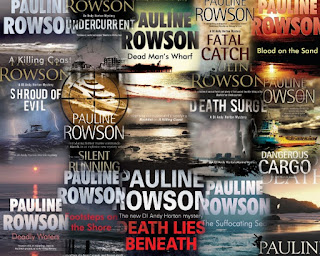The perfect system for writing a novel
"Once they find a favourite way of getting their words on paper - or screen - novelists normally stick with it, says Philip Hensher," in the Daily Telegraph recently, and that is true because it takes a writer some time to evolve the perfect system that works for him or her. It did with me anyway.
Before I struck on the 'perfect system' I tried all sorts of ways of compiling my research, plots and character outlines, from using note books to wall maps, to A4 folders. None of them worked. The A4 folders looked nice and neat, all properly indexed, but because of my civil service training my mind told me that something in a file, was 'filed away,' actioned, finished with and a novel is a work in progress, or at least it is with me until I am holding the actual printed book in my hand. Notebooks worked for a while but I got tired of flicking through various pages trying to find the precise piece of information I needed, when I needed it. And they weren't much use for containing the research pulled off the Internet, and from other sources. Wall maps were soon a no,no. They looked messy and very rapidly got covered with notes pinned over them. So what next?
I'm not really sure how I evolved my current system of working but gradually it came together so that now all my plot lines and character outlines are executed in pencil on recycled bits of A4 paper. The plot lines and each character outline is held together by a treasury tag (or India Tag). The individual characters have their name flagged up at the top of the paper. The research from various sources is then tagged on to that character and/or the plot line, and all this stays on my desk in a three tiered tray system until the novel is finished and sent to my editor, when it moves to a table behind my desk and sits there while it progresses to the printed version and I turn to writing the next novel. Nothing is filed away until the novel in question has been printed.
As to the actual writing tool - then it is straight on to the computer for me, so easy for editing.
Developing the method that works for a writer is much like developing his or her style of writing. It takes time, and trial and error until something clicks and, as the man says, once you find what works for you, you usually stick with it.
Before I struck on the 'perfect system' I tried all sorts of ways of compiling my research, plots and character outlines, from using note books to wall maps, to A4 folders. None of them worked. The A4 folders looked nice and neat, all properly indexed, but because of my civil service training my mind told me that something in a file, was 'filed away,' actioned, finished with and a novel is a work in progress, or at least it is with me until I am holding the actual printed book in my hand. Notebooks worked for a while but I got tired of flicking through various pages trying to find the precise piece of information I needed, when I needed it. And they weren't much use for containing the research pulled off the Internet, and from other sources. Wall maps were soon a no,no. They looked messy and very rapidly got covered with notes pinned over them. So what next?
I'm not really sure how I evolved my current system of working but gradually it came together so that now all my plot lines and character outlines are executed in pencil on recycled bits of A4 paper. The plot lines and each character outline is held together by a treasury tag (or India Tag). The individual characters have their name flagged up at the top of the paper. The research from various sources is then tagged on to that character and/or the plot line, and all this stays on my desk in a three tiered tray system until the novel is finished and sent to my editor, when it moves to a table behind my desk and sits there while it progresses to the printed version and I turn to writing the next novel. Nothing is filed away until the novel in question has been printed.
As to the actual writing tool - then it is straight on to the computer for me, so easy for editing.
Developing the method that works for a writer is much like developing his or her style of writing. It takes time, and trial and error until something clicks and, as the man says, once you find what works for you, you usually stick with it.

Comments